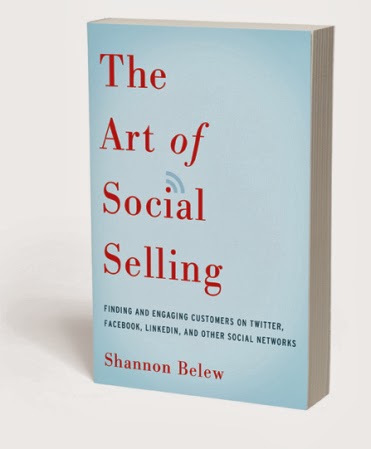If you are a salesperson or sell a product or service, make, The Art of Social Selling, the next book you read.
Author Belew defines "social selling" as the identification, targeting, and reaching out to prospective and existing customers through social media channels and social communities in an effort to engage them in conversations that result in a potentially mutually beneficial relationship.
- Social selling does not replace all other sales and marketing processes. It simply means adding another tool to your toolkit...and tool, when mastered, will help you find and engage customers on Twitter, Facebook, Linkedin and other social networks.
- Without social selling, 40 percent of sales teams make less than 80 percent of quota, on average (Xactly research).
- 46 percent of people surveyed in late 2011 turn to social media when making purchasing decisions (Nielsen)
- Buyers no longer depend on salespeople to provide information and educate them on products or solutions -- Buyers now have extended number of places they can get this information
- 67 percent of B2C companies surveyed use Facebook to generate leads (Webmarekting123)
- 60 percent of best-in-class companies train salespeople in how to engage in online conversations with prospects and customers compared to only 19 percent of laggard companies (Aberdeen Group)
The key to social selling -- your ability to build relationships, using social media.
Belew recommends you participate in these types of places in order to start selling:
- Social media networks
- Visual social networks
- Blogs
- Communities
- Answer hubs and groups
- Online media/new sites
Her recommended 10 most important rules for online social interactions are:
- Be genuine
- Listen, listen, listen
- Be responsive
- Follow the leader
- Tailor the conversation
- Be helpful
- Identify the enter and exit signs
- Maintain the separation of professional and personal
- Be consistent
- Admit when you're wrong
Unclear about what you can include in your forthcoming social selling activities, Belew suggests:
- Evergreen content
- Topical content
- How-to content
- Lists
- Testimonials and customer success stories
- Q&A's
- Polls/Surveys
- Infographics
- eBooks
- Curated content
- User-generated content
- Product/service demonstrations (particularly via video)
- Interviews with company leaders (particularly via video)
Finally, according to SocialMediaExaminer, by spending as little as six hours per week in social media. 68 percent of marketers reported gain benefits in the area of lead generation, and 40 percent also realized an improvement in sales.
Belew's new book features compelling case studies, and clear and concise instructions on how to master the art of social selling.




Comments
Post a Comment